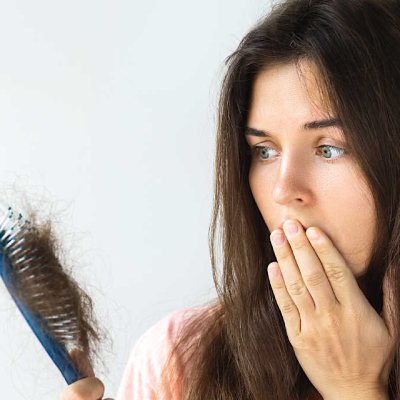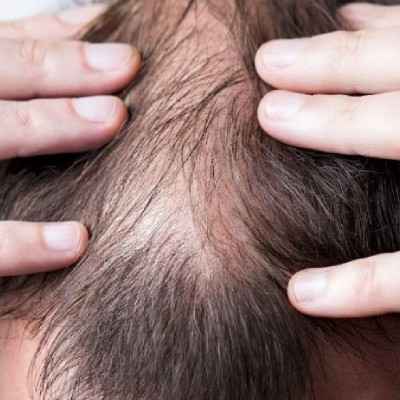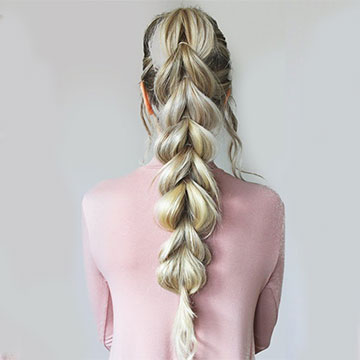Oil for Hair Growth: Does it Work?

07 May 2022

Hair Experts @ AHS

For ages, our ancestors have praised the benefits of oil for hair loss. All the grannies would sit with a bowl of oil and rub it on the scalp and hair of all the children in the house. We might not have appreciated their gestures then, but now we can understand the science behind putting oil in hair.
For ages, our ancestors have praised the benefits of oil for hair loss. All the grannies would sit with a bowl of oil and rub it on the scalp and hair of all the children in the house. We might not have appreciated their gestures then, but now we can understand the science behind putting oil in hair.
According to Ayurveda, certain oils have regenerative properties and minerals that can combat hair loss. Amla oil, coconut oil, bringadi oil — these oils were once considered holy grail by our grannies. But do these oils work on hair shedding now? The answer is yes. Hair loss has become more prominent in recent years. Even men and women in their early 20s and 30s are experiencing it. So, instead of blindly buying any hair loss treatment off the shelf, see how oils can help you.
Causes of Hair Loss in Women
While hair loss is mostly associated with men, women are not immune to it. Many women, especially the younger generation, have recently been complaining about hair shedding. Here are some factors that might be triggering your hair loss:
1. Female Pattern Hair Loss
Androgenetic alopecia or baldness is generally associated with men, but it can also cause hair loss in women.
In men, androgenetic alopecia begins above both the temples and creates an M-shaped pattern. The hairline keeps receding as the baldness progresses. In women, the pattern, however, is not that well-defined. One of the ways to identify it is to see if you are losing hair in your middle parting, as the hair loss usually manifests there. Like men, baldness in women can also be caused due to genetics and environmental factors.
2. Hormones
Hormonal imbalance is one of the most common factors for hair loss in women. Women with PCOS and thyroid often experience hair shedding. Some new mothers undergo hair fall in clumps too. It usually happens due to decreasing estrogen levels soon after childbirth. Unlike androgenetic alopecia, hormonal hair loss is temporary and easily reversible.
Another common condition when hormones trigger hair loss temporarily is during menopause. Many women see their hair coming back once they have completed the cycle of menopause, though it might not be that full.
Also Read : Effective Ways To Treat Hair Loss Caused By Hormonal Imbalance
3. Medical Conditions
Certain diseases and medical conditions have a negative impact on hair. As our internal organs pump all the energy to protect the ailing part of the body, hair, which is seen as a non-essential part of the body by the organs, suffers the most. You can lose hair if you have:
- Anemia (low iron level in blood)
- Thyroid
- High fever or infections
- Diabetes
- Autoimmune disease, known as alopecia areata
- Scarring alopecia
4. Stress
It cannot be emphasized enough that stress can wreak havoc on your overall health., We might see it as just the brain CPUs doing some overthinking, but it can cause irreversible damage to your hair and body.
Many dermatologists have expressed that most women suffer hair loss due to stress. Stress can lead to loss of appetite and sleep, triggering hair shedding. Adopt mindful activities like meditation, take care of your nutrition, and take expert help if your stress compromises your quality of life.
5. Diet and Nutrition
A sudden weight loss of over 15 pounds can also lead to hair loss. Some other reasons may include:
- Little intake of protein, iron, and other nutrients
- Too much vitamin A in the form of supplements
- Anorexia and bulimia
- Too little vitamin D
- Improper hair Care
6. Damaging Hairstyles
In addition to using heating equipment on hair, certain hairstyles also make your hair prone to hair loss. If you like to tie your hair in a tight ponytail or a bun, you risk hair shedding. Tightly tying your hair puts pressure on the roots, making them weak. Let your hair breathe, and avoid damaging hairstyles and heavy hair accessories.
7. Chemical Treatments
It goes without saying that chemical treatments do more damage than good to your hair. Not all chemical treatments are equally bad, but most are marketed as solutions for hair loss, which is far from the truth. If you absolutely have to, you can splurge once in a while but in general, stay away from harsh chemical treatments as they can cause hair shedding and hair loss. In some cases, this can even be permanent.
Is Oil Treatment Effective in Hair Loss?

Our hair follicles have sebum-producing glands that keep the roots nourished. In most cases, these glands are the reason for hair loss. Treating your scalp with an oil massage encourages blood flow that promotes hair growth. In cases where the glands are not producing enough sebum, oil can prove to be the best hair treatment.
A good hair oil supplements natural hair sebum while providing proper moisture and protection to hair cravings. As per clinical trials, coconut and olive oil helps resist up to 30% of UV rays.
However, it is important to note that an oil treatment is not always the right answer for hair loss.
Here’s what you should know:
- Apply oil to the roots only if you have a dry scalp
- Apply oil to the strands, avoiding roots; if you have an oily scalp and dry hair
- Avoid oil if you have dandruff
Benefits of Applying Hair Oil
As a hair loss treatment, applying offers a range of benefits. Here are some:
- Hair strengthening: Hair oil helps increase hair elasticity, making it less vulnerable to breakage.
- Protection against heat damage: By coating hair strands with a layer of protective oil, you can guard them against heat and pollution.
- Hydrates and prevents dullness/frizz/dryness: Oils rich in vitamin E and fatty acids are great for forming a barrier to prevent your hair strands from losing moisture. The barrier even prevents hair humidity from keeping frizz and dryness at bay.
- Promotes hair growth: As hair oils strengthen and hydrate the hair shaft, they prevent hair breakage while making your hair grow faster.
- Protects from UV rays: Plant phenols are present in botanical oils with a natural ability to prevent and reverse harmful UV rays’ impact on hair and skin. Some oils even offer 30% more protection than bare hair. So, apply them when swimming, staying in heat for a long time, etc.
Which Hair Oils are Good for Hair Growth?
Every hair oil offers different benefits. For example, almond oil is known for soothing and moisturizing, coconut oil softens hair, amla oil makes hair darker, and neem oil fights bacteria and fungus. Depending on your hair type, texture, and concern, you should choose the right hair oil for yourself.
Some popular oils for hair loss are:
- Coconut oil: It softens and strengthens hair. It is also an affordable option.
- Neem oil: It is a universal healer. Packed with antioxidants, it helps with dandruff and fungal infections.
- Bhringadi oil: provides a cooling sensation to the scalp and prevents infection
- Amla oil: Rich in Vitamin C, it fastens hair growth and prevents early greying.
- Jojoba oil: Great for extremely dry and chemically treated hair
- Avocado oil: Helps in preventing breakage and split ends
How to Apply Oil for Hair Regrowth?
Massing hair oil into the scalp is good for blood circulation. It also improves hair growth over time. Here is how to properly apply oil to your hair for maximum benefits:
- STEP 1: Before oiling your hair, brush properly to detangle the knots. It will ensure the oil application process is simpler and easier.
- STEP 2: After that, keep sectioning your hair in two or more parts for convenient application. Keep pulling each section and applying the oil to each section gently.
- STEP 3: Pour around one teaspoon of the desired oil on the palm and then rub it between hands to spread it all over properly. Using the fingertips, you have to massage your scalp gently. It is best to use circular motions for working the oil in hair roots and use fingertips for scalp stimulation.
- STEP 4: Follow a consistent pattern for scalp massage and try to cover all scalp areas. Don’t forget to massage the back of your head as well. The areas behind the ears and right above the nape also need your attention. So, you need to massage them well.
- STEP 5: Every time, you need to take around one teaspoon of hair oil to work it into the scalp gently. It ensures there’s no dripping mess. Now that most of the scalp is covered, you need to start applying it through your hair length. Also, take some oil to apply it through the entire length of your hair.
- STEP 6: You must massage your scalp and hair for around 10-15 minutes. Also, keep combing the hair to ensure the oil spreads all over. After that, tie your hair and let it sit for 30 minutes. You may even leave your hair overnight. But never leave your hair with oil on for over 24 hours. It is because your hair will begin to attract dirt. So, you need to wash your hair the next morning or after 30 minutes or 1 hour using a mild shampoo.
Conclusion
Our environment has changed for the worse. Harsh sun rays and pollution are making hair lifeless and dull. The stress of the fast-paced life, poor nutrition, and disturbed sleep cycle is also causing hair loss in the younger generation.
In most cases, returning to the roots and traditional ways is the best way to fix things. Try oil for hair loss and see your luscious locks returning. In some cases, hair loss can only be reversed with the help of expert help. If you do not see hair regrowth even after six months of using oil for hair loss, consult our experts at Advanced Hair Studio for a long-term and customized solution.
Stay Updated
Subscribe to our email newsletter for helpful tips and valuable resourses
Be an influencer
Join forces with Advanced Hair Studio! Explore exciting collaboration opportunities tailored for influencers. Let's redefine haircare together.
Connect now












